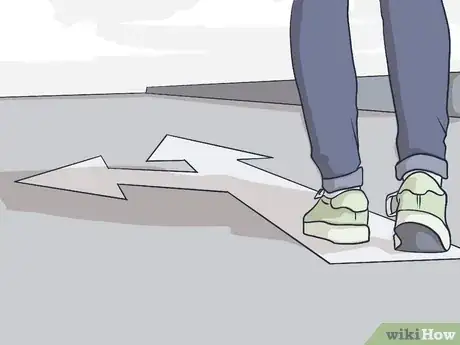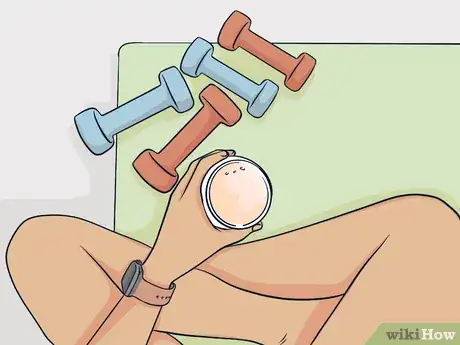This article was co-authored by Trudi Griffin, LPC, MS. Trudi Griffin is a Licensed Professional Counselor in Wisconsin specializing in Addictions and Mental Health. She provides therapy to people who struggle with addictions, mental health, and trauma in community health settings and private practice. She received her MS in Clinical Mental Health Counseling from Marquette University in 2011.
There are 14 references cited in this article, which can be found at the bottom of the page.
This article has been viewed 93,021 times.
Life moves quickly, and sometimes, when negative things pile up, it can be easy to lose sight of the things that make you and your life a success. There are several ways that you can enhance your happiness with your life. You can alter your focus, improve your attitude, and enhance your social life to move towards a greater sense of satisfaction with your life.
Steps
Changing Your Focus
-
1Practice gratitude. It can be easy to forget all that you have if you are thinking about where you would rather be. Practicing gratitude can help you to change your focus and acknowledge all of the good things in your life, which will enhance your positive feelings about your life.
- Try making a list of everything you are grateful for. Start by writing down five things that you feel grateful for and keep adding five more things to the list every day.
- You can add basic things to your list like a roof over your head, clothes on your back, and food to eat. Then, move onto more specific things that happen during your day, such as enjoying a good cup of tea, talking to an old friend, or watching a beautiful sunset.
- You can also review the whole list when you are feeling down about your life to remind yourself of everything that you feel grateful for.
-
2Concentrate on things you can control. It can be easy to feel overwhelmed at times and dwell on the unpredictable. Worrying about things you can’t control isn’t helpful because, of course, you can’t do anything about them, which makes you focus on your doubts and weaknesses. Instead, think about things you can change or improve, and focus your energy on working on those.[1] [2]
- For example, you can’t control the things that your coworkers do, but you can control your own work performance. Likewise, you cannot control the choices that your sister makes about her love life, but you can control the choices you make for your love life.
Advertisement -
3Think about your values. Try to clarify what is important to you. This doesn’t mean material success, but thinking about the kind of person you want to be and the traits that you value in other people. Once you have identified those values, you can think about how you already fulfill them.[3]
- One way to help clarify your values is to identify people that you admire. Ask yourself what it is you admire about them, and how you want to be more like them.
- You can also try making a list of the traits that you value in yourself and others, such as loyalty, honesty, creativity, and courage.
-
4Go easy on yourself. Self-criticism can be useful, helping us find weaknesses and create the chance to correct them. Of course, too much self-criticism is damaging to your self-esteem and can make you more miserable. Remember that no one is successful all the time and that failing to live up to lofty goals doesn’t make you a failure.[4]
- The best way to think about self-criticism is as an opportunity to improve, rather than a chance to point out all the things you don’t like about yourself. Find specific, changeable things about yourself that you can work on rather than blaming everything on universal or unchangeable traits. Rather than saying things like “I’m just not that smart,” tell yourself “I stayed up too late watching TV rather than studying. I can do better next time.” This can help motivate yourself to improve rather than focus on failure.[5]
-
5Avoid negativity. Negative thinking is a common part of our lives, but it is also something you can control. Consider the different ways you think negatively about the world, and make the conscious decision not to think that way. There are several common types of negative thinking. These are sometimes called cognitive distortions because they are ways of thinking that aren’t correct. Some common ones that hold you back from feeling good about your life include:[6] [7]
- All-or-nothing thinking. This involves looking at the world in black-or-white categories and ignoring possible gray areas or middle ground. One example might be you thinking that you need to get an A on a test, or else you are a failure. Remember that there are gray areas, and not fulfilling all of your goals does not make you a failure.
- Diminishing the positive. This is where you find ways to downplay your successes. You’ll ignore your good moments with excuses such as “I just got lucky.” It’s hard to feel happy with your life when you can’t accept any of your successes.
- Labeling. Here, you will use your shortcomings as a way to apply broad labels to your life. You may call yourself a “failure,” “loser,” “idiot,” or any other broad-based term. You may do things wrong on occasion, but this way of labelling yourself relies on your mistakes, rather than accounting for the things you do well.
-
6Make difficult choices rather than putting them off. One of the things that may be holding you back from being happy with your life is a difficult decision hanging over your head. After all, how content can you be knowing this big thing is waiting for you? Rather than letting it dwell with you, go address it head-on. Don’t put off decisions or fixes for later (some vague, unknowable time in the future), but address them as soon as you can.[8]
- For example, if you need to decide whether or not to break up with your boyfriend, then take some steps to come to a decision, such as discussing your feelings with a close friend or family member. If you need to decide on what college to attend, then make a pros and cons list and ask a parent or good friend to help you review your options.
Changing Your Attitude
-
1Smile more. Putting a smile on your face, even if you are feeling down, can help you feel better about yourself, whatever you are doing. You will be in a more positive mood, and able to think better about the big picture. Plus, smiling will make you look friendlier and more confident, the kind of person others want to meet and hang out with.[9]
- Try to remember to smile when you are going about your daily business, such as during your morning commute, while doing household chores, and even while relaxing in the evening. You might even want to set a reminder on your phone to remind yourself to smile more.
-
2Take a break. Sometimes it’s easy to get overwhelmed by a focus on where you are and where you need to be. The tension involved in trying to move quickly can cause stress. Taking a few minutes every day to pause and relax will help you recharge, and approach your challenges with energy.[10]
- Activities like yoga or mindfulness exercises, which force you to slow down and consider only the moment, are good ways to help slow down your daily grind. Doing them will make you pause and find space in your mind to focus on other things. Try taking a class or watching a video online to learn a basic yoga routine.
-
3Fake it. At first, it might be hard to just start appreciating your life, especially if you’re feeling down. So fake it. Put on a smile, or say something nice about somebody. You’d be surprised how this little change in your action can help change your mindset.[11]
- For example, if you are having a bad day at work, then try to take the focus off of yourself by asking a coworker how her day is going, or by giving someone a compliment. By focusing on someone else, you might find yourself feeling more positive and happy.
-
4Take care of your body. Your mental well-being is tied to your physical health. When you are trying to feel good about your life, make sure you are taking care of your body to be in the best physical shape possible. You don’t need to turn into a swimsuit model, but you do want to make sure you are taking care of yourself. Plus, as you get into better shape, you’ll begin to feel more confident in how healthy you look and feel.
- Exercising is a great way to get yourself in shape. Just a little bit of exercise, even something as simple as ten minutes of walking every day, helps get your muscles moving and causes your brain to release feel-good endorphins. Plus, when you work out, your body will look better, and you’ll have more energy.[12]
- Eat well. Good nutrition will help give you energy and keep your body looking good. Focus on whole grains, vegetables, and lean proteins while avoiding sweets and processed foods. Controlling your portions is another good way to help keep your weight normal and healthy.[13]
- Make sure you get enough sleep. Getting sleep can help you stay charged and positive, plus it will give you the energy to get things done. A full night’s sleep is great, of course, but you can supplement that with naps throughout the day if you need to. Most people need seven to eight hours of sleep every day to be at their best, but some can get by with a little less.
Talking to Others
-
1Spend time with people you care about. One way to feel good about yourself is to interact with people who matter to you. Seeing friends and family who you care about (and care about you) is a great way to rejuvenate yourself, and think about the good times you have had with them.[14] [15]
- If you are feeling down about yourself, call up a friend to talk or ask a friend to meet you for coffee. A good friend will be able to offer support or even just listen for a little while.
- It may seem easier to isolate yourself when you are feeling down, but keep in mind that this will not help you. It may be hard, but getting up and getting out of your house to go socialize with people is one of the best things you can do when you are feeling low.[16]
-
2Thank people for helping you. When people reach out to you and try to help you in some way, be sure to thank them for what they have done for you. These can be simple favors or support during tough times. Expressing gratitude like this is a great way to remind yourself of all the things other people have done for you, and it reminds you that you are someone other people want to help.[17]
- This doesn’t need to be people you know. Even just acknowledging or thanking a stranger who held the door for you can give you a little boost of happiness. Plus, he or she will probably appreciate your thankfulness, giving their day a boost as well.
-
3Help others. Volunteering and working with other people is a great way to feel better about yourself. Not only will you get the benefit of seeing someone else be happy, but you’ll also be able to pat yourself on the back for being the type of person who helps others.[18]
- Try volunteering to help out at a local food bank, or apply to be a volunteer dog walker for a local animal shelter.
-
4Cut back on your social media use. Websites like Facebook and Twitter can be fun, but they also waste time and can have a bad impact on your self-perception. It becomes too easy to worry about whether or not people are “liking” your posts. Additionally, watching other people have fun can hurt your self-confidence if you dwell too much on how happy they seem to be compared to you.
- One thing that can help is to remove some of your online “friends.” If you have people who are negative or inauthentic, they are cluttering up your space and bringing you down. This is especially good if they are people you don’t talk to at all. Focus on the people you do care about, and who provide positive benefits to your life.
- A positive way to use social media is as a springboard for in-person interaction. Don’t just “like” someone’s vacation photo. Reach out to them, and get together for lunch to talk about what they did. These kinds of meetings are more authentic and provide deeper and more meaningful relationships.
-
5Try not to take rejection personally. Sometimes we aren’t happy with our lives because someone else has rejected us or our ideas. Remember that this happens for all kinds of reasons, and it’s not a sign that you are a bad or worthless person. Instead, figure out why you were rejected, and learn from the experience.[19] [20]
- If you were rejected for professional reasons, consider asking why your ideas were not accepted. You may get some good advice about your idea that can help you improve it for next time.
- If you were rejected for personal reasons, like asking someone on a date, use this as an opportunity to remind yourself of your positive characteristics. Avoid catastrophizing, that is taking the worst-case scenario like saying no one will date you because you aren’t good enough. Instead, consider it an opportunity to try again, and have more success later.
Warnings
- If you are really feeling down about your life, and having trouble accomplishing any of these steps, you may be suffering from a mental health issue like depression or anxiety. Talk to a mental health professional, who will be able to diagnose your condition and prescribe treatment to help you live a happy and productive life.⧼thumbs_response⧽
References
- ↑ http://www.helpguide.org/articles/anxiety/how-to-stop-worrying.htm
- ↑ https://lifelabs.psychologies.co.uk/users/1536-sam-cleasby/posts/799-15-ways-to-make-your-life-happy
- ↑ http://psychcentral.com/blog/archives/2014/06/07/feeling-sad-try-these-5-ways-to-feel-happy-instead/
- ↑ http://greatist.com/grow/how-to-be-happy-long-term
- ↑ http://greatergood.berkeley.edu/article/item/four_ways_to_constructively_criticize_yourself
- ↑ http://www.huffingtonpost.com/kimanzi-constable/5-signs-youre-not-happy-with-your-life-and-what-you-can-do-about-it_b_8166980.html
- ↑ http://www.helpguide.org/articles/anxiety/how-to-stop-worrying.htm
- ↑ http://www.huffingtonpost.com/kimanzi-constable/5-signs-youre-not-happy-with-your-life-and-what-you-can-do-about-it_b_8166980.html
- ↑ http://www.inc.com/jeff-haden/10-scientifically-proven-ways-to-be-incredibly-happy-wed.html
- ↑ http://www.webmd.com/balance/features/why-youre-not-happy
- ↑ http://www.realsimple.com/health/mind-mood/emotional-health/10-ways-happier
- ↑ http://greatist.com/grow/how-to-be-happy-long-term
- ↑ https://medlineplus.gov/ency/article/002458.htm
- ↑ http://www.lifehack.org/articles/lifestyle/25-simple-ways-to-make-your-life-happier.html
- ↑ https://lifelabs.psychologies.co.uk/users/1536-sam-cleasby/posts/799-15-ways-to-make-your-life-happy
- ↑ https://www.psychologytoday.com/blog/prescriptions-life/201408/be-happy-you-have-go-your-own-way
- ↑ http://greatist.com/grow/how-to-be-happy-long-term
- ↑ http://www.inc.com/jeff-haden/10-scientifically-proven-ways-to-be-incredibly-happy-wed.html
- ↑ https://www.entrepreneur.com/article/246500
- ↑ https://www.psychologytoday.com/blog/thriving101/201012/rejection-losers-guide
About This Article
The key to living a happier life is creating meaningful and achieveable goals. Try to align yourself with your dreams, whether it's a career, a family, or mastering a talent. Everyone falls short of their ideals sometimes, but try to forgive yourself and view your mistakes as learning opportunities. You should also aim to help others whenever possible so you can make the world a better place. Consider volunteering in your community, helping out a friend or coworker, or even buying coffee for a stranger. Additionally, try to schedule time to catch up with your friends and family on a regular basis, which will help you feel more connected and social. It's also important to eat a healthy diet, sleep at least 7 hours a night, and exercise a few times a week. This helps to regulate your mood, improve your self-control, and keep you focused on your goals. For more tips from our co-author, including how to be grateful for what you have, read on!













































































